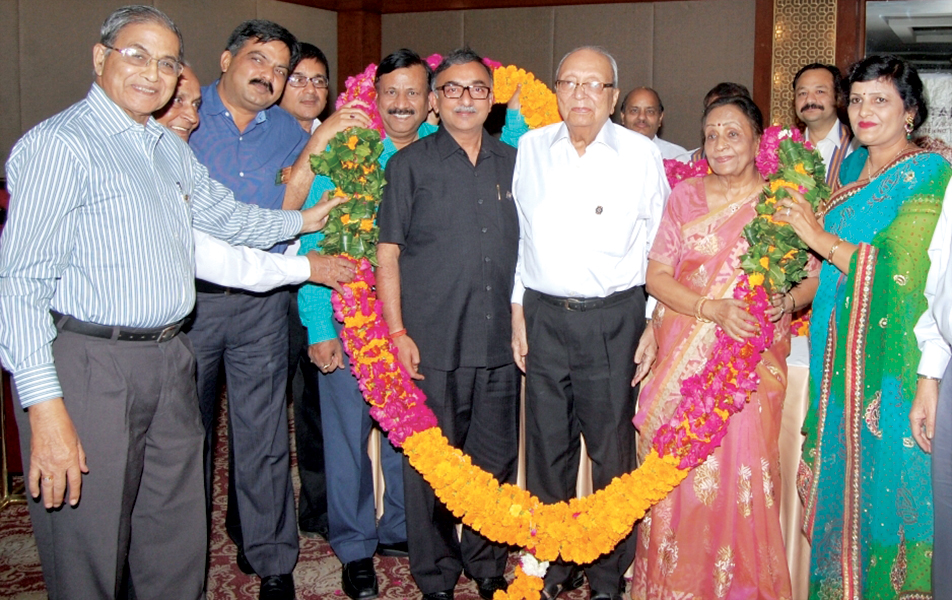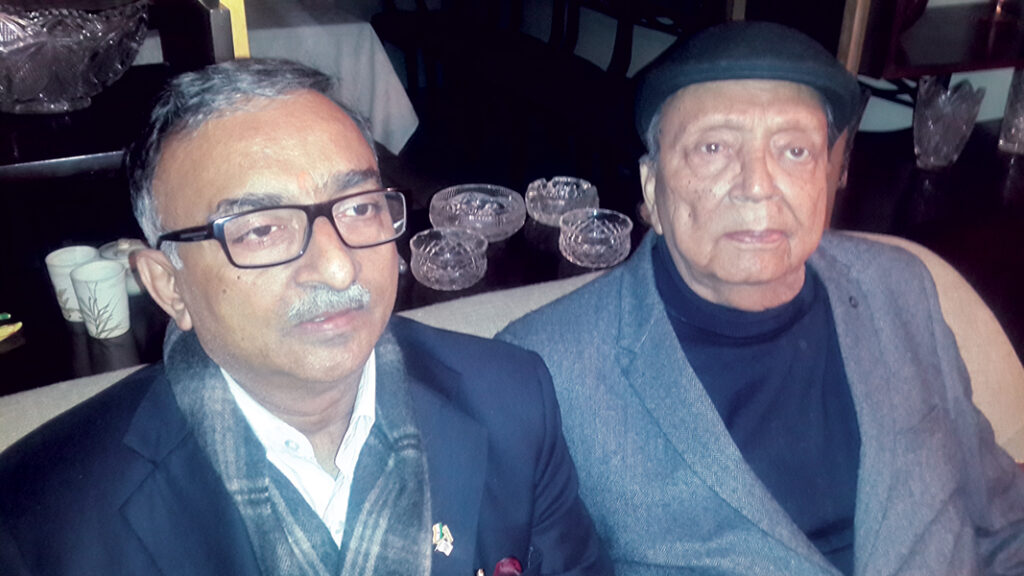He calls me to say how much he enjoyed the January issue “which was so colourful and I love your writing style. You write so well in Hindi.”

I hastily disabuse him about my Hindi language skills, which are modest, despite my bagging the Jawaharlal Nehru award in the Madras University for Hindi in the mid-1970s, and tell him that I write in English and it is the expertise of Hema Subramanian who does a fine job with the Hindi translation.
Meet PDG Prem Agarwal from RI District 3110, who joined Rotary Club of Agra way back in October 1955. Today there is a concerted effort across the Rotary world to attract young members, but in 1955, over 60 years ago, this 23-year-old bright young lawyer thought it fit to become a Rotarian. RC Agra was started in 1938.
On what attracted him towards Rotary, he says that he had started practising as a lawyer — he comes from a family of advocates — two years earlier in 1953. “I joined Rotary because PDG Pundit Rajnath Kunjroo told me that I should do so. I became the District Governor in 1978–79.” Today, at the age of 84, he regularly attends Rotary meetings. “To see him attend club meetings is an inspiration for all of us, particularly the younger members,” says District 3110 DG Sharat Chandra, adding, “we recently marked the milestone of his golden jubilee in Rotary by felicitating him.”
How Rotary changed him
He attributes all that he is today to his six decades’ experience in Rotary. “When I joined Rotary at the age of 23, I was a very shy person. Only in Rotary I learnt how to mix with people and reach out to everybody, and how to conduct myself at conferences.” So engrossed did he become in the world of Rotary, that he happily started attending various conferences, apart from his club meetings. “As a result of all this I felt that my family was very big and tried to attend every conference so that I could meet people and make more friends. But, more important, I felt that Rotary is the best organisation where I can serve humanity at large. This, in a nutshell, is my experience in Rotary.”
Many Rotarians today indulge in politics, particularly as soon as they become PDGs. I tell them you should forget you’re PDGs and do service.
Prioritising Hindi
On his special achievement during his year as DG in 1978–79, Agarwal says the first thing he did was to give importance to the local language, Hindi. “In those days, and perhaps now too, in our district there were many people who did not know much of English. This is the Hindi belt … so as soon as I became Governor, I said that our official language in Rotary will be Hindi. I also said people can talk in Hindi. Everybody cannot speak comfortably or fluently in English.”
The result was that when he said that it was alright for everybody to talk in Hindi and made it the medium of communication, “a lot of people started expressing their views candidly. Earlier, they were hesitant to speak. I consider that to be my biggest achievement during my year as Governor.”

Agarwal proudly says that he went to such an extent of promoting Hindi, “which is after all our own language” that “even to Rotary International we sent our communication/letters only in Hindi. They requested us to please send the English translation, but I said that when you can translate so many other languages, why not do so for Hindi too.” He is happy that after his stint, Hindi has “become the official language of our club and District … most of the proceedings take place only in Hindi.”
Another highlight of his governorship was attending the International Assembly which was quite an eye-opener for him and “after that I attended the Convention in Tokyo, where there were two sessions because around 44,000 people had registered! There I learnt how extremely disciplined the Japanese are. All these valuable experiences I got only because of Rotary. Another high point was attending the COL in Singapore.”
Disappointed
But this vintage Rotarian is concerned that today in Rotary, service is giving way to politics. “I keep telling people that you should get involved in Rotary’s work, particularly its service projects, in a much bigger way. But unfortunately, it is sad to see that many people today have started indulging in politics, particularly as soon as they become PDGs. I tell them you should forget that you’re PDGs and instead of indulging in politics, you should be busy doing service.”
On the one major difference he finds in Rotary then and now is that “in the earlier years, all of us were really committed to service. But aaj Rotary me baatein jyada aur kaam kum hota hei. Kabhi kabhi bada disappointment hota hei ki Rotary kya tha aur ab kya ho gaya hei. (But today there is more talk and less work happening in Rotary. Sometimes I get very disappointed thinking about what Rotary once was and what it has become today.)”
He also regrets that today many youngsters do not stay on in Rotary; “many of them join only for entertainment, or to get some post. Once they’ve become the club secretary or president, they leave. Today’s youngsters are not serious about Rotary, and that is disturbing.”
Regular attendance
So how difficult does he find it to attend club meetings regularly? “It is not difficult, I go regularly, the only difference is that these days I have to use a walking stick!” But he loves to go and keep in touch with the Rotary world “because apart from getting to know about the service projects, there is so much of fellowship and sharing of experiences. When we read Rotary Samachar with its inspiring articles, or the GML and Club bulletins, we find out what is happening in the Rotary world and also outside,” says Agarwal, who has a deep interest in education and is there on many prestigious educational bodies in Agra.
He particularly looks forward to the views of PRIP Rajendra K Saboo. “I just love his thoughts … the way he thinks and feel I can learn a lot from him, and so can all Rotarians.”





